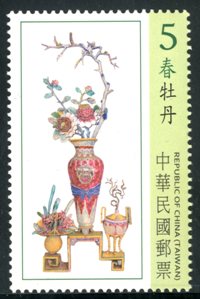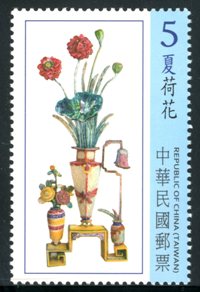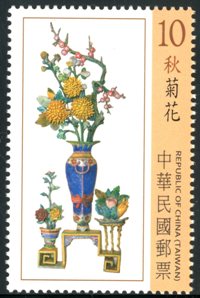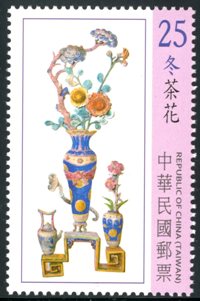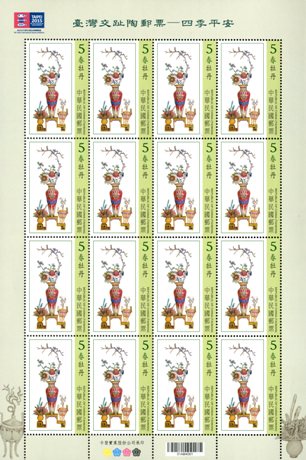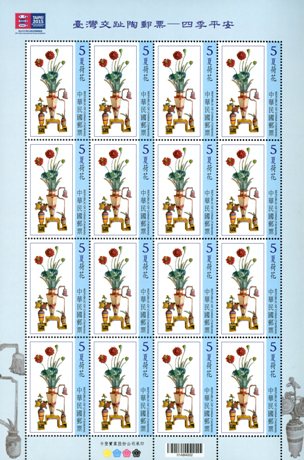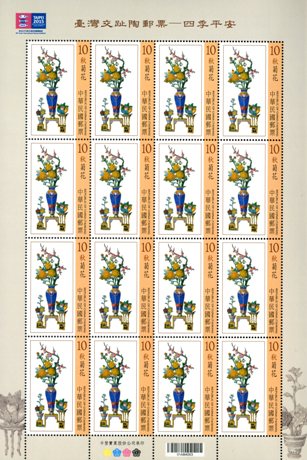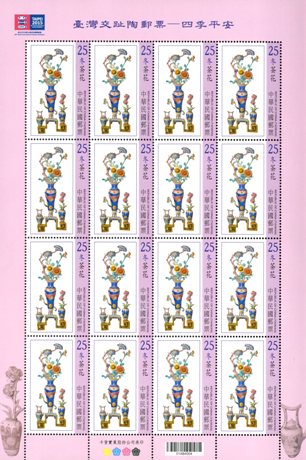Sp.613 Taiwan Koji Pottery Postage Stamps – Peace during All Four Seasons
| Stamp SN | D613 |
|---|---|
| Stamp Name | Sp.613 Taiwan Koji Pottery Postage Stamps – Peace during All Four Seasons |
| Stamp Cat Standard | Special Stamps |
| Stamp Cat | Handicrafts, Antiques |
| Issue date | 2014-11-14 |
| Suspersion date | |
| Dimension of stamps(mm.) | 33 × 51 (mm) |
| Size of souvenir Sheet (mm.) | |
| Printer | Cardon Enterprise Co., Ltd. |
| Drawer | |
| Designer | Hung-tu Ko |
| Photographer | |
| Engraver | |
| Creative Director | |
| Sheet composition | 16 (4 × 4) |
| Print color | Colorful |
| Process | Offset |
| Paper | Phosphorescent stamp paper |
| Back | |
| Perforation | 13 1/2 |
Koji pottery refers to a kind of low-fired pottery made from very pliable clay and decorated with many layers of vividly colored glazes. This pottery evolved from the green-glazed pottery of the Han Dynasty as well as the sancai (three-color) pottery of the Tang and Ming dynasties and the Khitan Empire. It was introduced to Taiwan some 200 years ago and has been widely used for architectural embellishments in temples. To showcase the beauty of Taiwan’s Koji pottery, Chunghwa Post is issuing a set of four stamps featuring four decorative wall elements from the Yi Gate of the Taipei Confucius Temple. Each of these elements features seasonal flowers. The designs follow:1. Spring Peonies (NT$5): In China, the peony is the queen of flowers and has been used to represent riches and honors since ancient times. An orchid basket and an incense burner are placed on either side of a vase with an arrangement of peonies and plum branches to suggest wealth and prosperity.2. Summer Lotuses (NT$5): Lotuses and water lilies are regarded as the most righteous of flowers. Lian (water lily) is a homonym for incorruptible in Chinese. It symbolizes passing the imperial exam and being an honest official. The lamp, a homonym for son, on the right symbolizes a lineage that lasts forever.3. Autumn Chrysanthemums (NT$10): Chrysanthemums signify longevity and indifference to fame or gain. The arrangement also includes plum blossoms, which suggest integrity, and a wax apple, which symbolizes wealth.4. Winter Camellias (NT$25): The camellias in the tall vase are matched with evergreen pine branches symbolizes longevity. The ruyi scepter behind the vase signifies auspiciousness and fulfillment of one’s wishes. On the right side of the vase, roses, which are also known as “flowers of everlasting spring” in Chinese, symbolize eternal youth.
(1) First Day Cover: NT$3 apiece(2) Folder (with or without mount): NT$8 apiece(3) Loose-leaf album page: NT$16 apiece(4) Pre-cancelled FDC affixed with a NT$5 stamp: NT$8 apiece(5) Pre-cancelled FDC affixed with a complete set of stamps: NT$48 apieceTo purchase the relative philatelic products, please go directly to the post office branches, or order on line at http://stamp.post.gov.tw.
Sp.610 Ancient Chinese Art Treasures Postage Stamps – Blue and White Porcelain
Sp.610 Ancient Chinese Art Treasures Postage Stamps – Blue and White Porcelain
YOU MAY ALSO LIKE
By category
By Topic
By Year






